#Friedrich Durrenmatt
Explore tagged Tumblr posts
Text
Squash’s Book Roundup of 2022
This year I read 68 books. My original goal was to match what I read in 2019, which was 60, but I surpassed it with quite a bit of time to spare.
Books Read In 2022:
-The Man Who Would Be King and other stories by Rudyard Kipling -Futz by Rochelle Owens -The Threepenny Opera by Bertolt Brecht -Funeral Rites by Jean Genet -The Grip of It by Jac Jemc -Jules et Jim by Henri-Pierre Roche -Hashish, Wine, Opium by Charles Baudelaire and Theophile Gautier -The Blacks: a clown show by Jean Genet -One, No One, One Hundred Thousand by Luigi Pirandello -Cain’s Book by Alexander Trocchi -The Man with the Golden Arm by Nelson Algren -Three-Line Novels (Illustrated) by Felix Feneon, Illustrated by Joanna Neborsky -Black Box Thrillers: Four Novels (They Shoot Horses Don’t They, Kiss Tomorrow Goodbye, No Pockets in a Shroud, I Should Have Stayed Home) by Horace McCoy -The Dictionary of Accepted Ideas by Gustave Flaubert -The Chairs by Eugene Ionesco -Illusions by Richard Bach -Mole People by Jennifer Toth -The Rainbow Stories by William T Vollmann -Tell Me Everything by Erika Krouse -Equus by Peter Shaffer (reread) -Ghosty Men by Franz Lidz -A Happy Death by Albert Camus -Six Miles to Roadside Business by Michael Doane -Envy by Yury Olesha -The Day of the Locust by Nathaniel West -Thus Spoke Zarathustra by Friedrich Nietzsche -The Riddle of the Labyrinth: The Quest to Crack an Ancient Code by Margalit Fox -The Cat Inside by William S Burroughs -Under The Volcano by Malcolm Lowry -Camino Real by Tennessee Williams (reread) -The Private Memoirs and Confessions of a Justified Sinner by James Hogg -The Quick & The Dead by Joy Williams -Comemadre by Roque Larraquy -The Zoo Story by Edward Albee -The Bridge by Hart Crane -A Likely Lad by Peter Doherty -The Stranger in the Woods: The Extraordinary Story of the Last True Hermit by Michael Finkel -The Law In Shambles by Thomas Geoghegan -The Anti-Christ by Friedrich Nietzche -The Maids and Deathwatch by Jean Genet -Intimate Journals by Charles Baudelaire -The Screens by Jean Genet -Inferno by Dante Alighieri (reread) -The Quarry by Friedrich Durrenmatt -A Season In Hell by Arthur Rimbaud (reread) -Destruction Was My Beatrice: Dada and the Unmaking of the Twentieth Century by Jed Rasula -Pere Ubu by Alfred Jarry -Bitter Fame: A Life of Sylvia Plath by Anne Stevenson -Loot by Joe Orton -Julia And The Bazooka and other stories by Anna Kavan -The Haunting of Lin-Manuel Miranda by Ishmael Reed -If You Were There: Missing People and the Marks They Leave Behind by Francisco Garcia -Detransition, Baby by Torrey Peters -Indelicacy by Amina Cain -Withdrawn Traces by Sara Hawys Roberts (an unfortunate but necessary reread) -Sarah by JT LeRoy (reread) -How Lucky by Will Leitch -Gyo by Junji Ito (reread) -Joe Gould’s Teeth by Jill Lepore -Saint Glinglin by Raymond Queneau -Bakkai by Anne Carson -Reflections in a Golden Eye by Carson McCullers -McGlue by Ottessa Moshfegh -Moby Dick by Herman Melville -The Hour of the Star by Clarice Lispector -In the Forests of the Night by Amelia Atwater-Rhodes (reread from childhood) -Chicago: City on the Make by Nelson Algren -The Medium is the Massage by Malcolm McLuhan
~Superlatives And Thoughts~
Fiction books read: 48 Non-fiction books read: 20
Favorite book: This is so hard! I almost want to three-way tie it between Under The Volcano, The Quick & The Dead, and The Man With The Golden Arm, but I’m not going to. I think my favorite is Under The Volcano by Malcolm Lowry. It’s an absolutely beautiful book with such intense descriptions. The way that it illustrates the vastly different emotional and mental states of its three main characters reminded me of another favorite, Sometimes A Great Notion by Ken Kesey. Lowry is amazing at leaving narrative breadcrumbs, letting the reader find their way through the emotional tangle he’s recording. The way he writes the erratic, confused, crumbling inner monologue of the main character as he grows more and more ill was my favorite part.
Least favorite book: I’d say Withdrawn Traces, but it’s a reread, so I think I’ll have to go with Detransition, Baby by Torrey Peters. I dedicated a whole long post to it already, so I’ll just say that the concept of the book is great. I loved the whole idea of it. But the execution was awful. It’s like the exact opposite of Under The Volcano. The characters didn’t feel like real people, which would have been fine if the book was one written in that kind of surreal or artistic style where characters aren’t expected to speak like everyday people. But the narrative style as well as much of the dialogue was attempting realism, so the lack of realistic humanity of the characters was a big problem. The book didn’t ever give the reader the benefit of the doubt regarding their ability to infer or empathize or figure things out for themselves. Every character’s emotion and reaction was fully explained as it happened, rather than leaving the reader some breathing space to watch characters act or talk and slowly understand what’s going on between them. Points for unique idea and queer literature about actual adults, but massive deduction for the poor execution.
Unexpected/surprising book: The Riddle of the Labyrinth: The Quest to Crack an Ancient Code by Margalit Fox. This is the first book about archaeology I’ve ever read. I picked it up as I was shelving at work, read the inner flap to make sure it was going to the right spot, and then ended up reading the whole thing. It was a fascinating look at the decades-long attempt to crack the ancient Linear B script, the challenges faced by people who tried and the various theories about its origin and what kind of a language/script it was. The book was really engaging, the author was clearly very passionate and emotional about her subjects and it made the whole thing both fascinating and fun to read. And I learned a bunch of new things about history and linguistics and archaeology!
Most fun book: How Lucky by Will Leitch. It was literally just a Fun Book. The main character is a quadriplegic man who witnesses what he thinks is a kidnapping. Because he a wheelchair user and also can’t talk except through typing with one hand, his attempts to figure out and relay to police what he’s seen are hindered, even with the help of his aid and his best friend. But he’s determined to find out what happened and save the victim of the kidnapping. It’s just a fun book, an adventure, the narrative voice is energetic and good-natured and it doesn’t go deeply into symbolism or philosophy or anything.
Book that taught me the most: Destruction Was My Beatrice by Jed Rasula. This book probably isn’t for everyone, but I love Dadaism, so this book was absolutely for me. I had a basic knowledge of the Dadaist art movement before, but I learned so much, and gained a few new favorite artists as well as a lot of general knowledge about the Dada movement and its offshoots and members and context and all sorts of cool stuff.
Most interesting/thought provoking book: Moby Dick by Herman Melville. I annotated my copy like crazy. I never had to read it in school, but I had a blast finally reading it now. There’s just so much going on in it, symbolically and narratively. I think I almost consider it the first Modernist novel, because it felt more Modernist than Romantic to me. I had to do so much googling while reading it because there are so many obscure biblical references that are clear symbolism, and my bible knowledge is severely lacking. This book gave me a lot of thoughts about narrative and the construction of the story, the mechanic of a narrator that’s not supposed to be omniscient but still kind of is, and so many other things. I really love Moby Dick, and I kind of already want to reread it.
Other thoughts/Books I want to mention but don’t have superlatives for: Funeral Rites was the best book by Jean Genet, which I was not expecting compared to how much I loved his other works. It would be hard for me to describe exactly why I liked this one so much to people who don’t know his style and his weird literary tics, because it really is a compounding of all those weird passions and ideals and personal symbols he had, but I really loved it. Reading The Grip Of It by Jac Jemc taught me that House Of Leaves has ruined me for any other horror novel that is specifically environmental. It wasn’t a bad book, just nothing can surpass House Of Leaves for horror novels about buildings. The Man With The Golden Arm by Nelson Algren was absolutely beautiful. I went in expecting a Maltese Falcon-type noir and instead I got a novel that was basically poetry about characters who were flawed and fucked up and sad but totally lovable. Plus it takes place only a few blocks from my workplace! The Rainbow Stories by William T Vollmann was amazing and I totally love his style. I think out of all the stories in that book my favorite was probably The Blue Yonder, the piece about the murderer with a sort of split personality. Scintillant Orange with all its biblical references and weird modernization of bible stories was a blast too. The Quick & The Dead by Joy Williams was amazing and one of my favorites this year. It’s sort of surreal, a deliberately weird novel about three weird girls without mothers. I loved the way Williams plays with her characters like a cat with a mouse, introducing them just to mess with them and then tossing them away -- but always with some sort of odd symbolic intent. All the adult characters talk and act more like teens and all the teenage characters talk and act like adults. It’s a really interesting exploration of the ways to process grief and change and growing up, all with the weirdest characters. Joe Gould’s Teeth was an amazing book, totally fascinating. One of our regulars at work suggested it to me, and he was totally right in saying it was a really cool book. It’s a biography of Joe Gould, a New York author who was acquaintances with EE Cummings and Ezra Pound, among others, who said he was writing an “oral history of our time.” Lepore investigates his life, the (non)existence of said oral history, and Gould’s obsession with a Harlem artist that affected his views of race, culture, and what he said he wanted to write. McGlue by Ottessa Moshfegh was so good, although I only read it because 3 out of my other 5 coworkers had read it and they convinced me to. I had read a bunch of negative reviews of Moshfegh’s other book, so I went in a bit skeptical, but I ended up really enjoying McGlue. The whole time I read it, it did feel a bit like I was reading Les Miserables fanfiction, partly from the literary style and partly just from the traits of the main character. But I did really enjoy it, and the ending was really lovely. In terms of literature that’s extremely unique in style, The Hour Of The Star by Clarice Lispector is probably top of the list this year. Her writing is amazing and so bizarre. It’s almost childlike but also so observant and philosophical, and the intellectual and metaphorical leaps she makes are so fascinating. I read her short piece The Egg And The Chicken a few months ago at the urging of my coworker, and thought it was so cool, and this little novel continues in that same vein of bizarre, charming, half-philosophical and half-mundane (but also totally not mundane at all) musings.
I'm still in the middle of reading The Commitments by Roddy Doyle (my lunch break book) and The Hero With A Thousand Faces by Joseph Campbell, but I'm not going to finish either by the end of the year, so I'm leaving them off the official list.
#squash rambles#reading year in review#book list year in review#book list#reading list#book roundup#reading roundup
7 notes
·
View notes
Text
2024 (60)
the temple of the golden pavilion (yukio mishima) - 9/10 miss julie (august strindberg) - 8/10 the father (august strindberg) - 8/10 interpreter of maladies (jhumpa lahiri) - 10/10 on earth and in hell: early poems (thomas bernhard) - 6/10 the slave girl (buchi emecheta) - 10/10 the homecoming (harold pinter) - 9/10 the boy who followed ripley (patricia highsmith) - 9/10 beartown (fredrik backman) - 9/10 hymns to the night (novalis) - 8/10 in a german pension (katherine mansfield) - 7/10 the tunnel (ernesto sabato) - 8/10 between two worlds (miriam tlali) - 9/10 tales of hulan river (xiao hong) - 10/10 family ties (clarice lispector) - 10/10 butterfly burning (yvonne vera) - 9/10 i saw ramallah (mourid barghouti) - 10/10 fences (august wilson) - 10/10 almond blossoms and beyond (mahmoud darwish) - 8/10 «selected stories of xiao hong» (xiao hong, howard goldblatt ed.) - 10/10 the stream of life (clarice lispector) - 9/10 the perfect nine: the epic of gikuyu and mumbi (ngugi wa thiong'o) - 8/10 over all the mountain tops (thomas bernhard) - 7/10 why did you leave the horse alone? (mahmoud darwish) - 8/10 brocade river poems (xue tao) - 9/10 human mourning (jose revueltas) - 8/10 return of the spirit (tawfik al-hakim) - 9/10 the visit (friedrich durrenmatt) - 10/10 down and back: on alcohol, family, and a life in hockey (justin bourne) - 10/10 juha (juhani aho) - 10/10 only in the meantime & office poems (mario benedetti) - 9/10 springtime in a broken mirror (mario benedetti) - 10/10 the sonnets (stephane mallarme) - 7/10 bestiary: or the parade of orpheus (guillaume apollinaire) - 8/10 maze of justice: diary of a country prosecutor (tawfik al-hakim) - 9/10 tales and stories for black folks (toni cade bambara et al) - 10/10 the black woman (toni cade bambara et al) - 10/10 fictions (jorge luis borges) - 10/10 a raisin in the sun (lorraine hansberry) - 9/10 memory for forgetfullness (mahmoud darwish) - 10/10 black friend: essays (ziwe) - 10/10 are prisons obsolete? (angela y. davis) - 10/10 waiting for godot (samuel beckett) - 10/10 the garden party (vaclav havel) - 9/10 dust tracks on a road (zora neale hurston) - 9/10 wild thorns (sahar khalifeh) - 10/10 everything good will come (sefi atta) - 10/10 men in the sun and other palestinian stories (ghassan kanafani) - 10/10 minutes of glory and other stories (ngugi wa thiong'o) - 10/10 midaq alley (naguib mahfouz) - 9/10 a man of letters (taha hussein) - 7/10 the beggar's opera (vaclav havel) - 8/10 soul gone home (langston hughes) - 8/10 mulatto (langston hughes) - 10/10 the weary blues (langston hughes) - 9/10 the quarter (naguib mahfouz) - 10/10 pedagogy of the oppressed (paulo freire) - 10/10 after midnight (irmgard keun) - 9/10 a gentleman in moscow (amor towles) - 7/10 peace and its discontents (edward said) - 10/10
0 notes
Text

Alredered Remembers Swiss playwright and novelist Friedrich Dürrenmatt, on his birthday.
"The difference between humans and wild animals is that humans pray before they commit murder."
-Friedrich Durrenmatt
0 notes
Text
Aspettando l'Autunno Book Tag
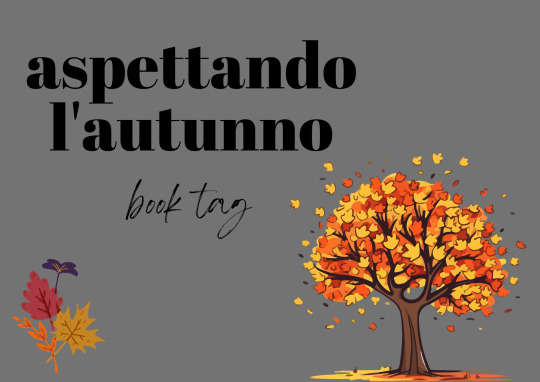
Ciao a tutti!! Questa settimana vi propongo un nuovo book tag trovato sul Book Tube. Oggi parliamo di autunno, in particolare vi mostro libri già letti e libri che vorrei leggere con vibes autunnali. Scrivetemi pure i vostri titoli autunnali!! Buona lettura!!
Pioggia: un libro che leggeresti volentieri cullato dal ticchettio della pioggia sul tetto.

"Il Sospetto" di Friedrich Durrenmatt è un romanzo breve che lessi lo scorso anno, proprio nel periodo autunnale e ricordo di averlo apprezzato moltissimo anche per le vibes tetre che pone al lettore. Perfetto da leggere in una giornata piovosa.
Foliage: un libro dalle diverse sfaccettature.

Passiamo, ora, alla letteratura americana del novecento con "Giovanni's Room", o "La Stanza di Giovanni", di James Baldwin. Questo romanzo narra di una relazione alquanto complicata tra due ragazzi a Parigi, ma questo è solo il punto di partenza che l'autore usa per poter parlare di ben altro: la società dell'epoca, la libertà personale, la solitudine.
Autunno, Dove Sei?: nomina quattro libri che non vedi l’ora di leggere quando arriverà la stagione.
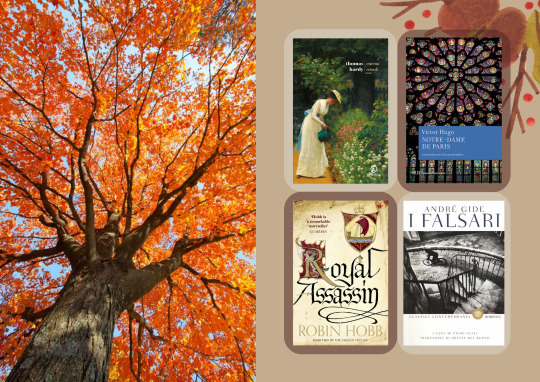
Sono molto curiosa di proseguire il mio percorso di lettura degli autori Thomas Hardy e Victor Hugo con, rispettivamente, "Estremi Rimedi" e "Notre-dame de Paris". Parlando sempre di classici, vorrei approcciarmi ad André Gide con la sua ultima opera "I Falsari". Infine, cambiando completamente genere, vorrei proseguire con la trilogia Farseer di Robin Hobb, leggendo il secondo volume "Royal Assassin".
Tè e Tisana: un libro che scalda il cuore.
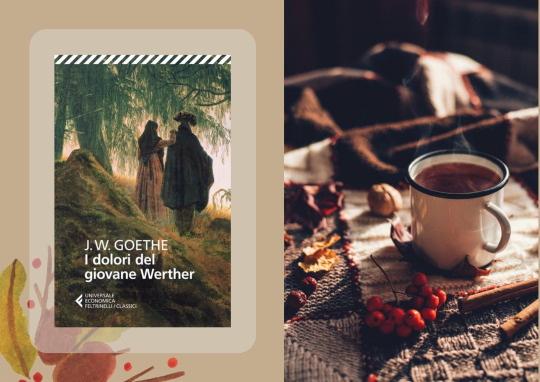
"I Dolori del Giovane Werther" di Goethe può sembrare un libro triste, e lo è, ma nella sua tristezza porta molto calore. Questo è un romanzo estremamente interiore, che parla di solitudine, di amore, di morte. Non ci si sente soli, ci si sente capiti e a propria volta si capisce.
Castagne: un libro che all’inizio ci sembrava un po’ spinoso, difficile ma che poi si è rivelato coinvolgente.
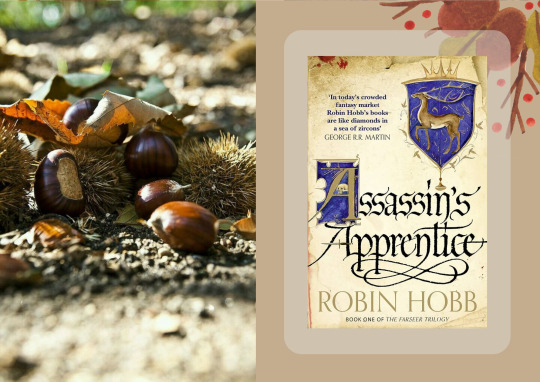
"Assassin's Apprentice" di Robin Hobb è il primo volume della trilogia Farseer (che apre una saga infinita); per me questa è stata una lettura alquanto impegnativa, in particolar modo per l'inglese che non ho trovato così facile come mi aspettavo. Una volta, però, abituatami allo stile, la lettura è diventata molto più scorrevole. Per quanto riguarda la trama, invece, questa mi ha catturato sin da subito, un po' intricata, ma decisamente accattivante.
Candele Profumate: un libro dalla forte atmosfera autunnale.
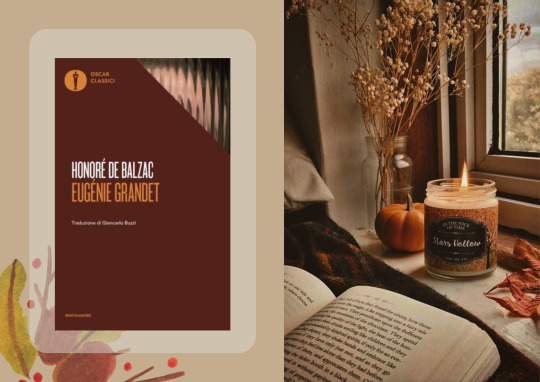
Nonostante "Eugenie Grandet" di Balzac sia ambientato in più anni e, quindi, in più stagioni, mi ha trasmesso molte vibes autunnali. Che dire di questo romanzo, si incentra sulla figura femminile di Eugenie Grandet, personaggio che non segue perfettamente i canoni di quell'epoca e, di conseguenza, molto interessante.
Zucca: un mattone da leggere in autunno.
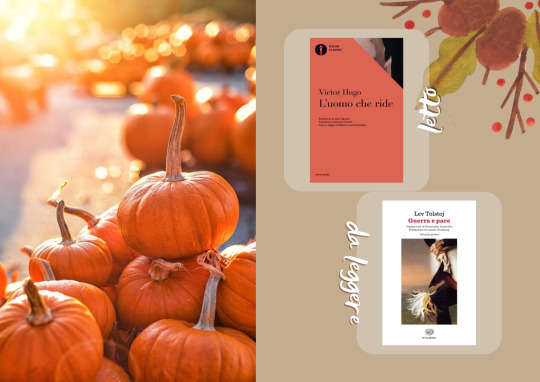
Qui, vi cito due libri, uno letto e uno da leggere. "L'Uomo che Ride" di Victor Hugo è un romanzo gotico estremamente drammatico, ma con un messaggio potentissimo e perfetto per l'autunno. Invece, questo autunno mi piacerebbe affrontare la sfida di "Guerra e Pace" di Tolstoj, ma vedremo in seguito come va...
Halloween: un libro che vuoi leggere quest’anno per halloween.
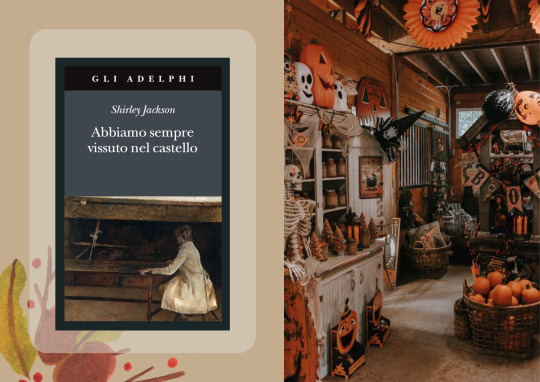
Non ho mai letto romanzi horror, ma quest'anno mi voglio buttare, perciò mi sono già preparata in libreria "Abbiamo Sempre Vissuto nel Castello" di Shirley Jackson, autrice ben conosciuta del novecento. Non so nulla di questo romanzo, come d'altronde di ogni romanzo che devo ancora leggere, e non so minimamente cosa aspettarmi.
Giacca: libro che hai da un po’ in libreria e che aspetti di leggere proprio in autunno.

È da Natale 2022 che attendo il suo momento e, per me, il suo momento è l'autunno. Sto parlando di "Spiriti e Creature del Giappone" illustrato da Benjamin Lacombe. Una raccolta di racconti giapponesi su creature mistiche, cosa c'è di meglio per una lettura autunnale!!
#book tag#booktag#book#books#libri#libro#tag#letteratura#literature#consigli di lettura#suggestions#tbr#to be read#reading
1 note
·
View note
Text
Truth is always a delusion.
— Friedrich Durrenmatt
1 note
·
View note
Text
ty for the tag!
three ships: once again um i don't ship that much at this current moment so probably just danbert ashbert and dan/ash
first ever ship: spottedleaf and firestar from warrior cats . whatever
last song: apparently ol' brush valley by dylan woe.begone griggs
last film: child's play
currently watching: ash vs evil dead (i'm stalling i don't want to finish itt) some other stuff too but i cant remember
currently reading: the visit by friedrich durrenmatt for lit
currently consuming: ummmm nothing
currently craving: hot chocolate tbh
open tags :3
tagged by: @lillyshazeleyes
Three ships: Rumbelle, Geralt/Yennefer, Hiccup/Astrid
First ever ship: Probably Rumbelle, tbh
Last song: Favorite Nightmare by Blanks
Last film: Genie (that new Melissa McCarthy Christmas movie. It was ok, not gonna be a favorite.)
Currently reading: Winterwood by Shea Ernshaw
Currently watching: The Artful Dodger, The Changeling, Bob's Burgers (because I never actually watched it so binging it for the hell of it)
Currently consuming: Microwave lasagna
Currently craving: Butterfinger (which I won't have, but I still want one)
no pressure tagging: @rye-satchel @faggotwalkwithme
5 notes
·
View notes
Text
CRIME FICTION INTERVIEW: VALERIO VARESI (ENGLISH VERSION)
Italian author Valerio Varesi has been a shining light in European crime fiction since the publication of his first book Latest news of a fugue in 1998, the Turin native switching seamlessly between his novels and his role as a journalist for the likes of la Repubblica.
His Commissario Soneri stories have been adapted into the TV series Nebbie e delitti , while he has also written historical-political novels collected in the volume Trilogia di una Repubblica .
His latest Soneri tale The Unseen has been translated into English by Joseph Farrell for UK audiences through Patrician Press and sees the Parma detective investigate an unsolved case of a dead body found in the Po River three years before.

Matthew Ogborn: Valerio, your evocative descriptions of the Po in The Unseen and previous tales are such a crucial part in the enjoyment of this series for me so how much research do you undertake to capture the unique atmosphere of the river and the quirky characters that live and work there?
Valerio Varesi: “Essentially this is based on my long observations of the river and my walks along its shores. I use the same method for the city of Parma and for the Apennines. In this way I incorporate these sensations which I then translate into images and put on paper. It's as if I photograph the scenery in my mind and record my impressions. As well as this, I talk to people at length. In the case of the Po, I visit sailing clubs and chat to the boatmen. I have made friends with the captain of a tourist ship sailing on the river. "
Much like Florida for Carl Hiaasen and Louisiana in James Lee Burke's Robicheaux novels, the setting serves as a character in itself. What is it that fascinates you about the Po?
“The river is a metaphor for life - 'everything flows' by Heraclitus. It also represents the power of nature: the mighty and apparently calm current concealing the mystery in the depths of its waters. The river which gives and takes away life. As in the presence of a great mountain or an endless sea horizon, we feel small and limited. We return to our mortal human nature in the face of what appears immortal. For this nature approaches the divine and represents it. "
You have a brilliant knack of making each character come alive in idiosyncratic ways, whether through offbeat description or natural dialogue. How important is that part of the writing process outside of the plot machinations and do you visit with people from all walks of life to nail it?
“Every writer is rather schizophrenic in the best sense of the word, namely that they know how to be someone other than themselves, identifying with their characters and experiencing different lives to their own. Writers steal other people's lives. Only in this way can I create credible characters. I often draw benefit from meeting people and observing them. In other cases I make use of widespread human typologies. This work is key because every storyline and every vision of the world needs characters to make them come alive. "
The Soneri books are also notable for the brutally honest descriptions of the passage of time and how it affects both Soneri and the people around him such as Angela. How cathartic is that for you and how does your background in philosophy influence the types of issues that you address?
“Soneri is a work in progress, he develops, he gets older, and he changes with time. Time is the most precious thing we are given and our life is a sort of countdown before the void. My commissario is conscious of this and is saddened by the passing of the years. He tries however to carry out his worldly tasks by him well as the stoics advised and, as Heidegger teaches us, he plans his life by him by being aware of death. Let's say that my studies have influenced his vision of reality - considering that Soneri is partly my alter ego. "
How important is it to you to receive recognition from the likes of international organizations such as The CWA here in the UK for your novels whether you are placed on a longlist, shortlist or win something outright?
“Very important, especially if recognition comes in the country with the most spoken language in the world and with top quality level of publishing. At times, in Italy, there is a feeling of living and writing in a restricted and provincial orbit. For me, being appreciated abroad is vital. I've also had good recognition and excellent sales in France. "

In these increasingly chaotic global times that we live in, what do you see as crime fiction's role both from the writer's perspective and also the reader's perspective?
"I think that crime fiction, noir, polar [a French term for cross between crime fiction and noir] and other types of this genre, have the function of being 'fact' novels. Evil must be written about not purely as an end in itself, but also as a social outcome - the result of a sickness created by the inequalities inside a community. The crime must be analyzed, asking why it happened, and not only questioning who committed it. From this point of view, crime fiction is like a doctor, who observing a symptom, goes on to discover the source of the illness. "
Speaking with your journalist hat on, do you think we have reached a tipping point in terms of how news outlets try to seek the truth in the face of rampant corruption as the public are flooded with lies through social media by special interests and people become entrenched in paranoid delusions?
"This age is bursting with information sources. At one time people received their information from traditional media, namely newspapers and television, now news arrives from every part of the internet world. As this world is completely uncontrolled, people, organizations, and actual manipulators are aiming to direct and influence public opinion with unverified and specifically fabricated false news. The trouble is that these forces can change the course of history. For example, if Britain chose to leave the European Union, it was partly because of the false news circulating, as shown by an Observer journalist. "
What do you see as religion's place in society now, especially in a country like Italy where it has underpinned life for so long, and how do you address this in your novels going forward?
“We live in a world, the western world, where traditional religion as a model for life and learning is almost totally irrelevant. This doesn't mean that spirituality doesn't exist, but it is expressed differently compared to traditional religion. At the same time, religion for some people in the rest of the world often crosses over to fanaticism which can lead to clashes, terrorism and violence. The coexistence in the West between European people and immigrants isn't easy, especially with Muslims whose values are so different to ours. I have addressed this topic in a book not published in English - Commissario Soneri and the laws of the Koran. "
What have been the biggest positives from the TV adaptations of your Soneri novels and are you encouraged by the increased scope of stories allowed with the rise of the streaming services and their budgets?
“The positives are many. My character has entered the Italian collective imagination and the very 'noir' atmosphere, with the fog and the Po Valley towns in the background, have shown a part of Italy not normally represented. I, as the author, am proud of this televised adaptation which gives my work an extra value. And the series is currently being broadcast on television streaming channels. "
Which other authors have you been reading recently and what else do you do to unwind properly?
“At the moment I am rereading one of my passions: (Friedrich) Dürrenmatt. Soon I must devote time to reading Jean-Claude Izzo, another passion of mine. This is to prepare for a conference in which I'll be speaking about him. Otherwise I relax by reading and running. "
Read the Italian version of this interview HERE .
Find out more about Valerio's books on his website HERE .
Read my interview with Valerio's English translator Joseph Farrell HERE .
#valerio varesi#joseph farrell#crime fiction#italy#italian#italia#parma#river po#books#reading#friedrich durrenmatt#jean-claude izzo#po valley#commissario soneri#the cwa#the crime writers' association#the unseen#carl hiaasen#james lee burke#robicheaux#Ultime notizie di una fuga#la repubblica#journalism#Trilogia di una Repubblica#patrician press#turin
3 notes
·
View notes
Text




What I wouldn’t have given to have heard Lesley Manville (hallowed be thy name) to have shouted out a line about selling pussy for a pay cheque.
#the visit or the old lady comes to call#the visit#vengance#lesley manville#tony kushner#national theatre#friedrich durrenmatt#durrenmatt
8 notes
·
View notes
Text
youtube
This fucking play.
7 notes
·
View notes
Text
The Cold Light of Day (1996) Review
The Cold Light of Day (1996) Review
Viktor Marek a rather troubled detective who is sacked from his role when he does not agree with the decision made by a superior in the arrest of a scapegoat for a pedophile who has murdered three little girls. He becomes obsessed with finding the actual killer. ⭐️ Continue reading

View On WordPress
#1996#Boudewijn de Groot#Doug Magee#Elizabeth McKechnie#Friedrich Durrenmatt#Gerard Thoolen#Heathcote Williams#Jade Hope#James Laurenson#Joanna Dickens#Lynsey Baxter#Natasa Hanusova#Nina Jirankova#Perdita Weeks#Review#Richard E. Grant#Robert Cavanah#Roger Sloman#Rudolf van den Berg#Simon Cadell#The Cold Light of Day#Thom Hoffman#Vladimir Kulhavy
1 note
·
View note
Quote
It is only in love and murder that we still remain sincere.
Friedrich Dürrenmatt
13 notes
·
View notes
Quote
Todas as culturas se fundam mais sobre preconceitos do que sobre verdades.
Friedrich Dürrenmatt
22 notes
·
View notes
Text
Incipit 97/100
Incipit 97/100
“Nel marzo scorso dovevo tenere a Coira, presso la Società Andreas Dahinden, una conferenza sull'arte di scrivere romanzi polizieschi. Vi arrivai in treno che già annottava - nuvole basse e un nevischio deprimente, e gelo dappertutto. La conferenza si tenne nella sala dell'Unione Commercianti. Il pubblico era piuttosto scarso, dato che quella stessa sera Emil Staiger parlava nell'aula magna del Liceo sull'ultimo Goethe. Non ero in vena quella sera - neanche gli spettatori lo erano del resto - e parecchi del luogo lasciarono la sala prima che la conferenza fosse finita.”
(La Promessa, di Friedrich Dürrenmatt – trad. Silvano Daniele)
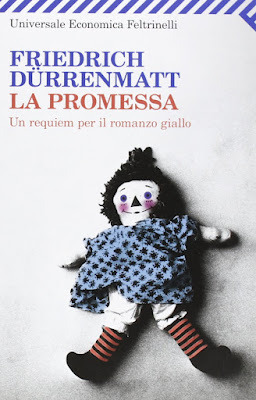

#incipit letteratura#incipit libri#incipit#frasi libri#libri letteratura#citazione libro#citazioni#feltrinelli#friedrich durrenmatt
1 note
·
View note
Text
A Dark Tale of Vengeance #durrenmattday #GermanLitMonth
A Dark Tale of Vengeance #durrenmattday #GermanLitMonth
As part of November’s German Literature Month, hosted by Lizzy and Caroline, today has been declared “Durrenmatt Day”! The plan, I believe, is to focus on writings by the author Friedrich Durrenmatt who’s known for his dark thrillers. I have an omnibus collection of his works but alas have run out of reading this month; so I thought instead I would share my thoughts on one of his titles which I…

View On WordPress
0 notes
Photo

Friedrich Durrenmatt : World history is tragic


0 notes
